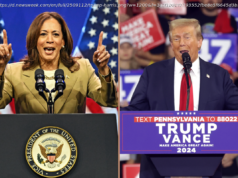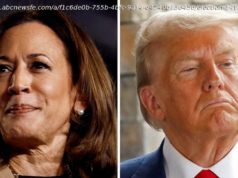The post appeared to be the culmination of a lobbying effort by a right-wing South African group that falsely claims that white farmers are being systematically forced off their land and killed in large numbers.
WASHINGTON — Like so many of President Trump’s late-night tweets, this one was inspired by a segment on his favorite cable channel, Fox News.
But when Mr. Trump announced Wednesday night that he was directing his secretary of state to scrutinize what he said was the targeting of white farmers for land seizures and “large-scale killing” in South Africa, the president waded into a complex and politically charged debate.
And in doing that, he embraced a common talking point among white supremacists who claim white genocide is being perpetuated in South Africa and around the world.
The presidential tweet on Wednesday night appeared to be the culmination of a lengthy lobbying effort by a right-wing South African group that falsely claims that white farmers are being systematically forced off their land and killed in large numbers. Its leaders traveled to Washington this year to press their case.
The debate over landownership has engulfed South Africa, where a proposal to seize land from white farmers has roiled a country still struggling with the effects of apartheid and widespread economic inequality.
White residents, who comprise about 8 percent of the population, own roughly 70 percent of the private farmland, according to government figures. And President Cyril Ramaphosa announced this month that the African National Congress would move ahead with a proposal to change the Constitution and allow the expropriation of some property without compensation.
His government has said that the move is necessary to deal with longstanding inequities. Only unused land would be subject to seizure, it added, suggesting that land that is being actively farmed would be safe. But opponents of the plan include far-right groups who have said that forced expropriations are already happening, and that white farmers are being killed in alarming numbers.
Mr. Trump’s seeming endorsement of that narrative drew rebukes and jubilation on Thursday. Anti-hate organizations called his tweet racist and irresponsible, while the alt-right and white supremacists said it was an overdue and courageous recognition by the president of what they called a grave injustice.
“This is the president of the United States taking up a narrative and an idea that has extremely strong resonance among white supremacists — that with demographic change all over the world, there is an ongoing genocide of whites that is getting worse, where minorities are literally trying to wipe out and dispossess white people,” said Heidi Beirich, who monitors hate groups at the Southern Poverty Law Center.
“Within white supremacy, there’s this idea of dispossession, that you are being dispossessed of your goods, your opportunities, perhaps your land,” Ms. Beirich added. “And they point to South Africa to say to fellow white supremacists or people who they see as potential recruits that this is what could happen to us.”
Mike Peinovich, a white supremacist whose podcast is called “The Daily Shoah,” called the president’s tweet about South Africa “very big.” He said on Twitter: “It may seem like a small thing, but this is how we slowly chip away at the all consuming antiwhite discourse. Let’s hope this is followed with action.”
Kallie Kriel, the chief executive of AfriForum, South Africa’s main advocacy group for Afrikaners, said that Mr. Trump’s comment had been a “huge step forward” for his organization.
On a tour of the United States this year, Mr. Kriel met with representatives of conservative think tanks in Washington, including the Cato Institute and the Heritage Foundation, as well as an aide to Senator Ted Cruz, Republican of Texas, and officials at the United States Agency for International Development.
During the trip, Ernst Roets, the group’s deputy chief executive, appeared on Tucker Carlson’s show on Fox — a staple of Mr. Trump’s cable news diet. In the studio, he and Mr. Kriel encountered John R. Bolton, Mr. Trump’s national security adviser, and snapped a picture with him that Mr. Kriel posted on Twitter, marveling at their “luck.”
He said they had given Mr. Bolton a copy of “Kill the Boer,” Mr. Roets’s book that claims the government has been complicit in killing white farmers. It also argues, according to the official website, that “a looming process of ethnic cleansing should be regarded as a serious threat and something to be prevented.”
On Thursday, the White House did not respond to requests for comment on what had prompted Mr. Trump to tweet about the issue.
But the president’s post came after Mr. Carlson broadcast a segment on his show on the landownership dispute in South Africa. He reported that land seizures were already well underway, and blasted the secretary of state, Mike Pompeo, for issuing what he called an “unbelievable” statement that called the land reform issue a “difficult” one without criticizing Mr. Ramaphosa’s approach.
The South African minister of international relations, Lindiwe Sisulu, described the tweet as “regrettable” and “based on false information.” The government said it would seek clarification from the United States Embassy.
The State Department also confirmed on Thursday afternoon that the chargé d’affaires there — the top-ranking diplomat in the country because Mr. Trump has yet to nominate an ambassador to South Africa — had met with its officials in the wake of the president’s comment.
Heather Nauert, the department’s spokeswoman, labored to steer clear of the racial overtones of the president’s statement. She said Mr. Trump had discussed the issue with Mr. Pompeo, and “asked the secretary to look closely at the current state of action in South Africa related to land reform.”
“The expropriation of land without compensation — our position is that would risk sending South Africa down the wrong path,” she said, refusing to say whether the State Department is concerned that it is happening.
Asked whether Mr. Pompeo had corrected Mr. Trump on the state of affairs in South Africa, Ms. Nauert said, “We never get into the private conversations between the secretary and the president.”
Patrick Gaspard, the United States ambassador to South Africa during the Obama administration, said that with his tweet, Mr. Trump had “walked right smack into some of the most supercharged politics that exist in any of our bilateral relationships anywhere around the globe.”
“Here you have a president of the United States who is trafficking in a white supremacist story line and talking point that has caused incredible damage in the country, in the region, and that is easily disproved,” he said.
“We have seen too many instances where Trump cabinet officials and his administration have shifted policy based on the latest irresponsible, and in this case reprehensible, tweet by the president, and so I hope the State Department resists that in this case,” Mr. Gaspard added.
The number of killings of farmers, including farm workers, in South Africa is at a 20-year low, 47 in the fiscal year 2017-18, according to research published in July by AgriSA, a farmers’ organization there. That is down from 66 during the previous fiscal year. The figures were consistent with a steady decline of violence since a peak in 1998, when 153 were killed.
But in an interview on Thursday, Mr. Kriel claimed that the murders of white farmers were underreported, and said without evidence that white farmers were “three to four times” more likely than the average South African to be killed.
Home
United States
USA — mix In Tweet, Trump Seems to Endorse Racist Narrative of South African Dispute






